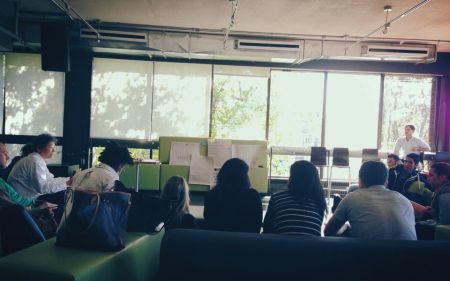For most students, corporate food providers on campus are the source of vivid, but not cherished memories. Scrounging one's last few toonies to pay for an overpriced, genetically modified sandwich from an exhausted and underpaid server; going to class hungry or undernourished. These are the images that come to mind when thinking about food on campus. A slew of recent cases of on-campus food poisoning have further diminished the reputation of concession providers like Sodexo.
On campuses, complaining about food providers is practically a competitive sport. The idea of building an alternative that responds to students’ needs, however, has been a desire long unfulfilled.
Students at Montreal’s Concordia University have a plan to improve food quality on campus, treat workers better, and make food more affordable.Their solution is a cooperatively managed café. They plan to transform The Hive, a current student hangout spot on Concordia's Loyola Campus, which will make customers, supporters of the café, and employees the main decision makers. By thinking outside conventional structures of café ownership and management, and questioning established ideas about who’s in charge and who benefits, they hope to create an environment that is beneficial to stakeholders and students alike.
The solidarity co-operative model, explained Lauren Aghabozorgi, a Sociology student at Concordia who has been working on the Hive for six months, is the best way to “get the community involved, and give students direct input about their own health and what’s available to them when it comes to food and dietary needs.”
Traditionally, co-operatives have one kind of member. Worker co-operatives are owned by workers, and consumer co-operatives are owned by their customers. Solidarity co-operatives bring together different types of member groups in support of a common goal. Democratizing daily operations “is what’s most exciting about co-operatives,” said Concordia Student Union's Vice President of Sustainability, Benjamin Prunty. With The Hive’s structure members have control and they can call meetings if they want to make changes to the café’s policies or operations. The Hive’s board will be composed of workers, supporters, and users. Board meetings will be open to members, and they will also hold general assemblies. Prunty noted that as a co-operative, each member gets one vote, regardless of their status.
Inclusive management facilitates collaborative solutions. When people come together through a democratic business model, there lies the “potential for creative freedom,” said Prunty.
High turnover is a problem that often plagues student-run operations, but Prunty says that this will be addressed through employees having a greater stake in the business. The Hive will display continuity by having a manager who “really believe[s] in the mandate of the co-op, and they’re more likely to work there if they have a living wage for much longer than a student is going to stay at Concordia,” added Prunty.
Food quality and sourcing are main concerns that are driving this initiative. “All you have is genetically modified, really expensive food that isn’t proportional with the students income, and those things should be accounted for,” said Aghabozorgi. The project’s founders are hoping to source as much organic and affordable food as possible, as well as eventually phasing in sustainable initiatives like composting and using biodegradable utensils.
By giving students and workers the opportunity to make decisions, Hive organizers say that their model reforms the undemocratic decision-making processes of the food industry. The three main corporations that supply food to academic institutions, Chartwells, Sodexo, and Aramark, are the source of widespread dissatisfaction. “Sodexo is the company that we booted out last time because of food poisoning, so that’s some pretty heavy negligence,” said Prunty. A 2011 report by The Link cited 37 cases of food poisoning affecting students living in residence at Concordia. This isn’t the only time Sodexo has come under public scrutiny for cutting corners. In 2012 in Germany, more than 11,000 school children fed by Sodexo suffered from food poisoning, 32 requiring hospitalization.
When decision-making occurs behind closed doors, away from the eyes and ears of the majority of people, Prunty explained, it enables corporations to focus on profit making motives over the well being of people. People don’t want the food they eat to be “somebody else’s profit motive,” said the spirited student activist, especially considering that it has been to the detriment of students in the past.
Due to the “democratic deficit in society,” Prunty believes these measures are crucial. The objective behind the co-operative structure of The Hive is not only to ensure that the decisions made actually reflect the diversity of wants and needs of those who use this cafe, but also to directly engage and empower students and the community. “We need to have more ability, more agency over the kind of the organizations that we interact with every day,” said Prunty.
Aghabozorgi believes that in order to avoid top-down models, people need to start building local economies through grassroots initiatives. “The problem isn’t going to be fixed from the top down,” she said. “That’s the inherent problem so if we want to change, it’s going to have to start from the bottom up.”
Overall, solidarity co-operatives like The Hive are inherently challenging the notion that decision-making power should be based solely on shareholder primacy. It makes one question whether we operate under an economic system that is far removed from the majority of people’s realities. The Hive is bucking the trend by participating in a movement that does not conform to typical business structures. Aghabozorgi said: “These sorts of co-operative models are the beginnings of a movement, the beginnings of adopting ways in which we can beat that sort of system.”
The café is set to open in January 2014 in its first phase, and they hope to have it fully complete by September 2014.



